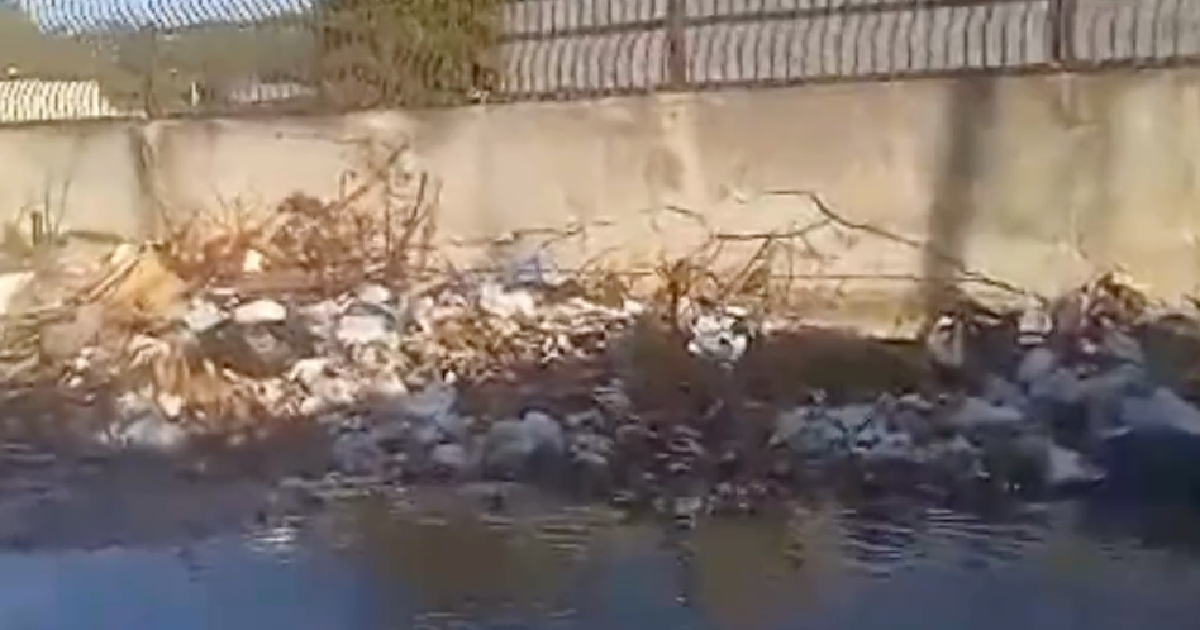Amid a severe crisis faced by Havana's Municipal Services, numerous areas of Cuba's capital are littered with garbage, including a landfill adjacent to the Frank País Orthopedic Hospital in the La Lisa municipality. This dire situation was reported by Martí Noticias, highlighting the chaos in the area, complaints from residents, and the surprising response from authorities.
"There is a huge landfill that has been there for months," activist Lucinda González told the media outlet. "It's filled with cockroaches, mosquitoes, rats... all of which reach the hospital rooms," she added, while the outlet published a revealing video on its Facebook page.
The former employee of the medical institution stated that she had personally raised the issue with local government officials, yet nothing has changed. Worse still, the Municipal Services company blames residents for being "irresponsible."
The report also features the perspective of Antonio Font, a resident of Centro Habana. "The accumulation of garbage is increasingly dangerous for the health of Havana's residents, especially in the historic district of the capital," he stated. "Although it's a city-wide issue, it's incredible how garbage is not collected. There are no resources to collect it, and wherever you go, there are mosquitoes, insects, cockroaches, rats—it's horrible," Font lamented.
Equipment Shortages and Resource Mismanagement
Following the breakdown of dozens of trucks donated by Japan, the Provincial Directorate of Municipal Services in Havana has a limited number of vehicles available for waste collection. According to an article in the official Granma newspaper, only 57 percent of the fleet is operational, while the capital generates 30,108 cubic meters of trash daily.
In 2023, the area produced 23,814 cubic meters of waste, but the Japanese donations between 2018 and 2019 provided Cuba with 100 garbage trucks. Additionally, the Asian country delivered 40 dump trucks, 25 mini-loaders, 50 motorized mowers, 25 chainsaws, and 15 pickup trucks for process control and oversight.
However, the most crucial equipment, Hino brand trucks, began to experience breakdowns in parts and components, with no quick solutions available. Currently, nearly half of these trucks are out of service. "The supplier company left the island and, due to the blockade, it is now impossible to sell the necessary parts directly or indirectly," the article states.
As a result, only 45% of tractors and 51% of dump trucks are currently operational, which is insufficient to collect waste in a city with nearly two million inhabitants, according to recently released figures.
The fuel crisis, resource diversion, and worker shortages also exacerbate the problem. "The management position is vacant or in the process of being filled in Arroyo Naranjo, Cerro, Centro Habana, San Miguel del Padrón, and Marianao—municipalities all facing complex situations," explained Miguel Gutiérrez Lara, head of the Supervision Group of the Provincial Government Inspection in Havana.
Given this nationwide scenario, the proliferation of filth and the increase in summer diseases are understandable. These include vomiting and diarrhea caused by flies, leptospirosis associated with rats, and mosquito-borne illnesses like dengue, Zika, chikungunya, and Oropouche, according to statements from Belkis Aracelis Barrera, an epidemiologist at the National Rehabilitation Hospital Julito Díaz.
Addressing Havana's Waste Crisis
Given the severe waste management crisis in Havana, residents and stakeholders are left with many questions. Here are some frequently asked questions and their answers:
Why is there so much garbage accumulation in Havana?
The garbage accumulation is primarily due to the breakdown of waste collection trucks and the lack of resources to repair or replace them. Additionally, there are issues with resource diversion and worker shortages.
What health risks are associated with the garbage problem?
The health risks include diseases caused by flies, rats, and mosquitoes, such as vomiting, diarrhea, leptospirosis, dengue, Zika, chikungunya, and Oropouche.
What has been the government's response to the crisis?
The government has blamed residents for being irresponsible and has not provided effective solutions to the waste management crisis.
Are there any plans to address the waste management issues in Havana?
As of now, no effective plans have been announced to address the waste management issues in Havana, leaving the situation unresolved.
